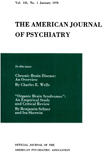THE CHILD WHO REFUSES TO ATTEND SCHOOL
Abstract
School refusal would seem to be a symptom complex appearing in more than one psychological configuration. In its acute form, it is felt to arise out of difficulties that the child has experienced in achieving a sense of autonomy. This has been due primarily to fluctuant limit setting by over involved parents. Direct management of the situation to control the symptom is essential to restore the child to normal growth patterns. Since symptom displacement and recurrence are not common it is suggested that the symptom in its acute form is more situational in character than indicative of a structured neurotic illness.
Access content
To read the fulltext, please use one of the options below to sign in or purchase access.- Personal login
- Institutional Login
- Sign in via OpenAthens
- Register for access
-
Please login/register if you wish to pair your device and check access availability.
Not a subscriber?
PsychiatryOnline subscription options offer access to the DSM-5 library, books, journals, CME, and patient resources. This all-in-one virtual library provides psychiatrists and mental health professionals with key resources for diagnosis, treatment, research, and professional development.
Need more help? PsychiatryOnline Customer Service may be reached by emailing [email protected] or by calling 800-368-5777 (in the U.S.) or 703-907-7322 (outside the U.S.).



